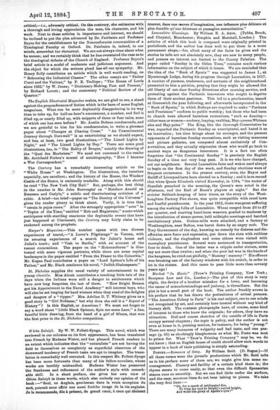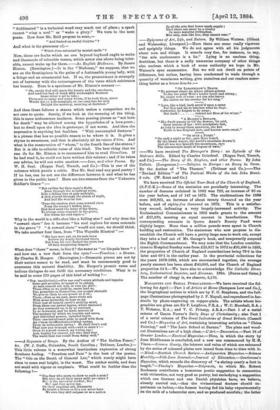PorritY. — Romance of Song. By William Reid. (D. Bogne.)—If all these
verses were the juvenile productions which Mr. Reid tells us in his preface some of them are, we might give him some en- couragement. Fluency and facility of a certain kind there is; the rhyme seems to come easily, so that even the difficult Spenserian stanza runs on smoothly. But we can find little under the surface, and the easy, sonorous lines do not bear taking to pieces. We take the very first lines : — " Oh, for a spark of sublimated fire,
To wing my soul to Delphi's sacred height, And wake the glory of Apollo's lyre I"
" Sublimated " is a technical word very much out of place ; a spark cannot "wing a soul" or "wake a glory." We turn to the next poem. How does Mr. Reid propose to scan,—
" And flashed on rueful Cocytns " ?
And what is the grammar of,— " Which thou enhanced by mental spells " ?
Now, these are faults which no one beyond boyhood ought to make and thousands of tolerable verses, which never rise above being toler- able, cannot make up for them.—An English Madonna. By James Hinton. (Remington.)—It is the "Madonna," we suppose, that we see on the frontispiece in the guise of a fashionable young lady, with a fringe and an ornamental hat. If so, the presentment is strangely out of harmony with the extravagance of the verse which celebrates her beauty. Here is a specimen of Mr. Hinton's manner :— " Oh. surely God will spare thy beauty and thy sweetness, And send the foot of death with unexampled fleetness Some other r. ad to take; There are so many and many whom, if he took them, never Would Art or Life complain, or one song less for ever
Delight the morning. sounding at daybreak."
And then there follows a stanza which makes a comparison we do not care to quote. Surely, if we look at the meaning of the thing, this is mere midsummer madness. Some passing phrase as "not born for death" may be allowed among the hyperboles of a love-poem ; but to dwell upon the idea is grotesque, if not worse. And then the expression is anything but faultless. "With unexampled fleetness" is a phrase that has no possible reason to be where it is. It gives a rhyme to sweetness, and that is absolutely all its raison d'être. And what is the construction of "whom," in the fourth line of the stanza ? But it is idle to criticise verse of this kind. The best thing that we can do for Mr. Hinton is to recommend him to read Firmilian. If he had read it, he could not have written this volume ; and if he takes our advice, he will not write another.—Ione, and other Poems. By W. H. Seal. (Kegan Paul, Trench, and Co.)—This is one of the volumes which puzzle a critic. Has Mr. Seal read any good poetry ? If he has, can he not see the difference between it and what he has given to the public here ? Here are two stanzas from the" Unknown Soldier's Grave" :— " But swifter far than eagle's flight,
Keen through the wreathing snow, Like a falling star at pale midnight, A shot pierced throngh the gloom of night, And laid the warrior low.
'Twos the random shot some coward slave
From the enemy's hidden lines, Had fired amid the hosts of the brave, To avenge some comrade in the grave, For whom his soul repine.'
Why in the world is a rifle-shot like a falling star ? and why does the "coward slave" fire it because "his soul repines for some comrade in the grave "? "A coward slave" would not care, we should think. We take another four lines, from "The Wayside Minstrel" :—
"His lays were sad, on his pale brow Sorrow lay deeply farrowed there,
But from his eyes flashed the stern vow Of duty conqueriug despair."
What does " there " mean, in line 2? the same as "on his pale brow" ? and how can a vow flash from the eyes P—Timoleon : a Drama, By Charles E. Hooper. (Remington.)—Dramatic poems are not by their nature meant to be read, and must be uncommonly good to overcome this natural disability. Mr. Hooper's prosaic verse and tedious dialogue do not fulfil the necessary conditions. What is to be said to some 170 pages of this kind of writing ?— Trm. (meditatively).--0'er our soul's every attitude and impulse
Some god presides, to tempt or to exhort, As such consult our will, or own the All's: Those often as we yield to, easier lead us, For, powerless in themselves, our proper strength
We give to them to ova power us wIth ;
These, often as we seek, more ready are With arms invincible to bear us up.
Their seat of council earth's undying mind, From them our power begins, which exercised As they commend us, is by us retained, In us increased, and we made mirrors of The mystery by which we breathe and move, And individual powers, installed beside These one-intentioned gods, to quaff with them An e'enmsre-efficacions-crowing nectar, From its unbounden spring ! So shall love's zeal That now you triumph with—and so mast I !— Grow to a great reward, my loving one ! And, hoping for success, yet who shall fear
The worst that can result from doing well."



































 Previous page
Previous page